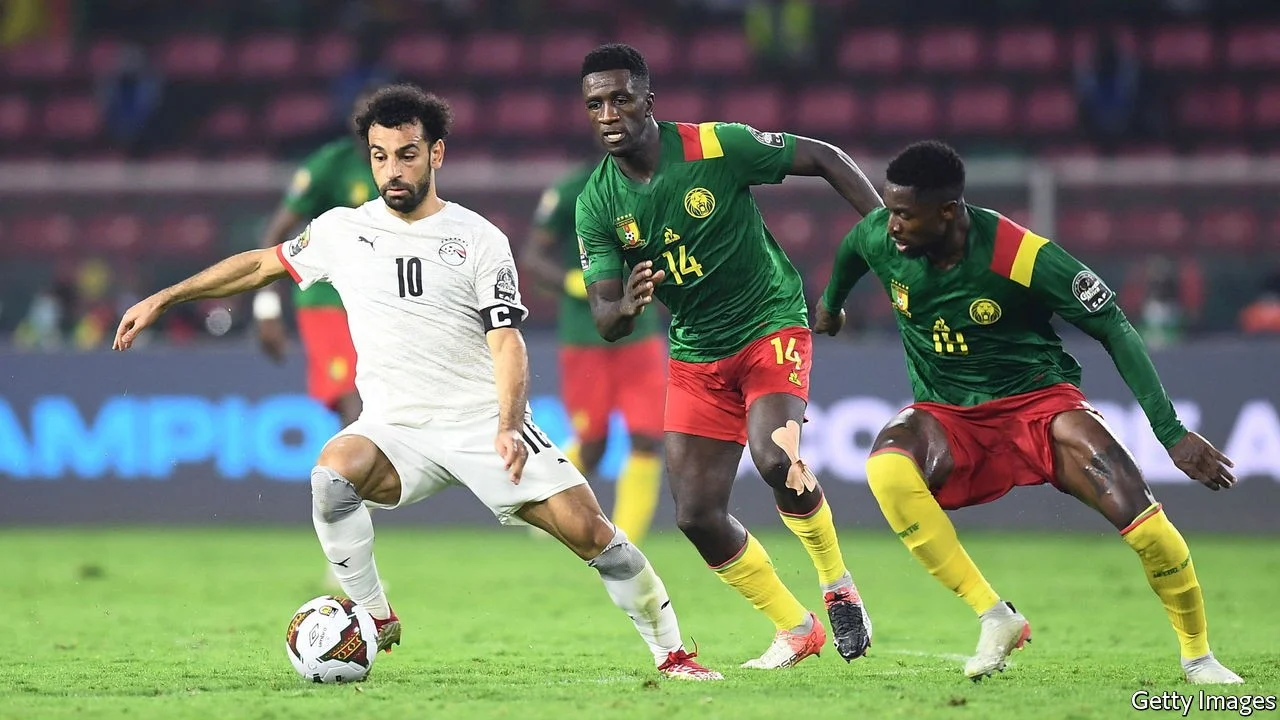
ON FEBRUARY 6TH television viewers from 157 countries will tune in to the final of the Africa Cup of Nations, a biennial tournament featuring some of the world’s best footballers. In the first semi-final, Senegal beat Burkina Faso 3-1 in an entertaining match, marked by quick counter-attacks, occasionally sloppy passing and some excellent refereeing. The second semi-final was a much more tense affair with no goals in regular or extra time. Egypt eventually overcame Cameroon, the hosts, in a penalty shoot-out.
The final has its own Merseyside subplot, as it will pit Liverpool forwards Mo Salah (of Egypt: pictured above, in white, in the semi-final) and Sadio Mané (of Senegal) against each other. They are just two of the African stars to play for European clubs—the world’s strongest. In fact, only four teams in the English Premier League don’t have a player from the continent. Besides Mr Salah and Mr Mané, Riyad Mahrez of Algeria is at Manchester City, Wilfred Ndidi of Nigeria is at Leicester City and Chelsea boasts Edouard Mendy, Senegal’s goalkeeper, and Hakim Ziyech of Morocco. In Italy’s Serie A, Kalidou Koulibaly of Senegal plays for Napoli and Franck Kessie of the Ivory Coast turns out for AC Milan. Eric Maxim Choupo-Moting of Cameroon and Bouna Sarr of Senegal both play for Bayern Munich, the dominant club in Germany’s Bundesliga.
So given the riches of talent available, why hasn’t an African country made a serious challenge for the World Cup? No team from the continent has ever made the semi-finals; Cameroon in 1990, Senegal in 2002 and Ghana in 2010 went out in the quarters. In 2018 no African side even made it past the group stage. Lack of resources are part of the problem: African countries and federations are poorer than their European counterparts. A counter-attacking style may be too; in the semi-finals all four teams were a little careless when it came to keeping possession. Lose the ball against Italy or Belgium, with their passing game, and a team can wait ten minutes to get it back.
Perhaps as a result, Africa’s hopes are not that great for the Qatar tournament later this year. In the fifa world rankings, the best-placed African team is Senegal, which is down in 20th spot—sandwiched between Wales and Iran, neither of which is a plausible World Cup winner. The next highest is Morocco in 28th. Egypt is 45th.
Football fans won’t know until late March, when five knock-out games complete the qualifying stages, which African sides will make it to Qatar. But at least two of the Africa Cup of Nations semi-finalists won’t. Burkina Faso didn’t get through to the knock-out stage, while Egypt and Senegal are scheduled to play each other in a match that will offer Sunday’s losers the chance of revenge.
If the rules allowed it, an all-Africa team would be a strong challenger for the World Cup. The problem is not talent, but how thinly resources are spread. There are 54 African countries, compared with just 17 in South America. Europe might seem to have a similar problem, with 44 countries, but its strength is concentrated; only five European teams have won the World Cup (England, France, Germany, Italy and Spain). Of the Africa Cup of Nations semi-finalists, Senegal has 17m people, Burkina Faso 21m and Cameroon 27m. All the other World Cup winners, bar Uruguay, are bigger.
Egypt, with 102m people, is the closest Africa has to a dominant footballing power. It boasts the most Africa Cup of Nations victories with seven (including one as the United Arab Republic, in 1959), and celebrated three successive wins in 2006, 2008 and 2010. But Egypt has only qualified three times for the World Cup and has never made it past the first round. With the magic of Mr Salah, one of football’s most likeable players, in front of goal, perhaps the Egyptians can do better this time. But they have to deal with Senegal, not just this weekend, but in the qualifiers.
By The Economist




